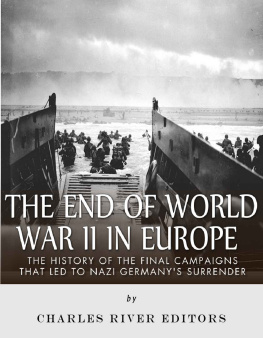THE MAN WHO NEVER WAS

The latest edition of this work has been brought to publication with the generous assistance of Marguerite and Gerry Lenfest.
Naval Institute Press
291 Wood Road
Annapolis, MD 21402
1953 by the Montagu Estate
Introduction 1996 by Alan Stripp
All rights reserved. No part of this book may be reproduced or utilized in any form or by any means, electronic or mechanical, including photocopying and recording, or by any information storage and retrieval system, without permission in writing from the publisher.
First Bluejacket Books printing, 2001
ISBN 978-1-61251-563-2 (eBook)
The Library of Congress has cataloged the paperback edition as follows:
Montagu, Ewen, 1901
The man who never was: World War IIs boldest counterintelligence operation / Ewen Montagu; introduction by Alan Stripp.
p. cm.
Originally published: New York: Oxford University Press, 1953.
1. Montagu, Ewen, 1901 2. Operation Mincemeat. 3. World War, 19391945Secret serviceGreat Britain. 4. World War, 19391945Personal Narratives, British. 5. World War, 19391945CampaignsItalySicily.
D810.S8M6 2001
940.54'8641dc21
00-052446

 Print editions meet the requirements of ANSI/NISO z39.48-1992 (Permanence of Paper).
Print editions meet the requirements of ANSI/NISO z39.48-1992 (Permanence of Paper).
12 11 10
All photographs courtesy of the Public Record Office, WO 106/5921.
Contents
TO MYSTIFY AND MISLEAD the enemy has always been one of the cardinal principles of war. Consequently, ruses de guerre of one kind or another have played a part in almost every campaign ever since the episode of the Trojan horse, or perhaps even earlier.
The game has been played for so long that it is not easy to think out new methods of disguising ones strength or ones intentions. Moreover, meticulous care must be exercised in the planning and execution of these schemes. Otherwise, so far from deceiving the enemy, they merely give the show away.
The Allies decided that their next step, after the battle for Tunisia, should be the invasion of Italy through Sicily. We felt sureone always does on these occasionsthat this was such an obvious corollary to the North African campaign, that the enemy would expect it and concentrate to meet it. What could be done to put them off the scent?
I so well remember how I was brought, one evening, the outlines of a cover plan which was ultimately given the somewhat gruesome name of Operation Mincemeat. I was, I confess, a little dubious whether it would work; but I put it up to the Chiefs of Staff, who approved it in principle. Thereafter, Lieutenant Commander Montagu, who originated the idea, and his colleagues went full steam ahead.
The operation succeeded beyond our wildest dreams. To have spread-eagled the German defensive effort right across Europe, even to the extent of sending German vessels away from Sicily itself, was a remarkable achievement. Those who landed in Sicily, as well as their families, have cause to be especially grateful.
It is not often that the whole story of a secret operation can be made public, told by someone who knows every detail. The military student can be grateful that chance has made it possible for him to have a textbook example of a very specialized branch of the art of war; others will enjoy a real-life thrillerwhich once more illustrates that truth is stranger than fiction.
Lord Ismay, G.C.B., C.H., D.S.O.
CERTAINLY THE BEST KNOWN, and perhaps the most successful deception operation of the entire war. That is how Sir Michael Howard, the official historian of strategic deception in the Second World War, aptly describes Operation Mincemeat, the story of the man who never was. It was a bold and imaginative plan, contrived with scrupulous care and executed with skill and courage. Above all it was, as the Chiefs of Staff gleefully reported to Churchill, then visiting Washington, swallowed whole by the German intelligence and operations staff. Its indirect resultfor deception, like intelligence, can do no more than help toward successwas not only a military victory but the saving of many Allied lives.
It is important to remember that operations of this kind (oprations dintoxication in the colorful French version) do not exist in a vacuum. The false idea that the first Allied landings in Europe would be in the eastern Mediterranean, and not in their self-evident target, Sicily, would not have been planted, or might never have taken root, if German intelligence had not been, as we already knew, predisposed to cherish it. We knew that was so largely from Ultra, the systematic British interception and breaking of German high-grade code and cipher signals, of which the number read by Bletchley Park (GCHQ) had passed the impressive total of four thousand a day by early 1943.
It is not surprising that the relatively inefficient Abwehr, the secret intelligence service of the German high command, was ready to swallow it. More importantly the plot hoodwinked the German supreme command itself From early May 1943 they were thus persuaded to rate the defense of Greece, and even of Sardinia, as more urgent than that of Sicily. Moreover, it was known from Ultra that Hitler personally believed that Greece was the likeliest target. Just as it had helped to suggest Mincemeat, Ultra monitored the consequent orders moving German units. Measures for defending Sardinia and the Greek Peloponnese were to have priority over everything else, two areas on the southwest coast of Greece were specified as likely Allied invasion targets, and the 1st Panzer Division began its laborious journey from France to Greece.
Even two weeks after the actual Allied landings in Sicily, Hitler still felt sure that the main assault would be on Greece. The same phenomenon was repeated a year later. His conviction that the Normandy landings were a sideshow, and that the real attack would come through the Pas de Calaisanother notion long fostered by the Allied deception plannerskept important forces (including one first-class unit, the 1st SS Panzer Division) out of the real battle during its most critical period.
We now know how widely Mincemeat was appreciated. In late May 1943 General Jodl, head of the German supreme command operations staff, was heard impatiently shouting down the telephone to the German military attach in Rome: You can forget about Sicily. We know its Greece. We may set this against Churchills remark, made as he approved Mincemeat: Anyone but a bloody fool would know it was Sicily. Such are the powers of self-persuasion.
Another factor was that the Germans knew also that the British forces available were far larger than they really were. That belief had been encouraged by our deception staff for several years, so that every bogus unit, even up to Army size, which they dreamed up found its way eventually into the German Order of Battle and stayed there. By late 1942 German intelligence had assessed the British army as some 45 percent larger than it actually was. That in turn made it easier to suggest that objectives were within our reach, which we knew to be outside it.
It is important to see Mincemeat not as an isolated episode but as part of a long and methodical policy of strategic deception. Barclay, the overall Mediterranean deception plan for 1943, had four main objects:
To weaken the defenses of Sicily;
To pin down enemy troops in the south of France and the Balkans peninsula;
To reduce enemy attacks on our ships as they gathered for the assault on Sicily; and
Next page







